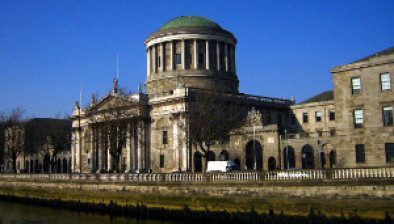Court of Appeal: John Downey loses appeal against order for his surrender to Northern Ireland
A man accused of offences relating to a car bomb in 1972 which killed two members of the UDR has lost an appeal against an order for his surrender on foot of a European Arrest Warrant.

About this case:
- Court:Court of Appeal
- Judge:Mr Justice Michael Peart
Finding that the question of whether the prosecution of John Downey would be an abuse of process due to the “letter of comfort” he received from the British government in 2007 was for the requesting jurisdiction to determine, Mr Justice Michael Peart dismissed the appeal.
Background
A European arrest warrant dated 31 October 2018 seeks the surrender of John Anthony Downey so that he can be prosecuted in Northern Ireland for murder and aiding and abetting the causing of an explosion likely to endanger life. The alleged offences for which he is to be prosecuted relate to a car bomb on 25 August 1972 which killed two UDR members and caused non-life-threatening injuries to army personnel.
In the High Court in March 2019, Ms Justice Aileen Donnelly made an order under s. 16 (1) of the European Arrest Warrant Act 2003, as amended, for Mr Downey’s surrender to the authorities in Northern Ireland, being satisfied that:
- All the relevant statutory requirements were fulfilled;
- There was no reason why his surrender should be refused under sections 21A, 22, 23 or 24 of the European Arrest Warrant Act 2003;
- His surrender was not prohibited by any provision within Part 3 of the European Arrest Warrant Act 2003.
Point of exceptional public importance
Following the hearing of an application for leave to appeal against the order, in March 2019, Ms Justice Donnelly made a further order pursuant to s. 16 (11) of the European Arrest Warrant Act 2003 certifying the following question as having a point of exceptional public importance:
“Where surrender of a person is sought in respect of alleged offences concerning violence of the utmost gravity, is it an abuse of process of the High Court to surrender that person in circumstances where an assurance was given by the authorities in the issuing state which led to the person to act to his detriment which facilitated the gathering of evidence when it has not been established in evidence that the assurance or the continued existence of the assurance was deliberately or intentionally given or maintained for the purpose of misleading the requested person to act to his detriment?”
Hyde Park bombing prosecution stayed
Crucial to Mr Downey’s argument that his surrender to face prosecution for the 1972 incident would amount to an abuse of process is the fact that his prosecution in respect of the Hyde Park bombing in 1982 was stayed by the Central Criminal Court in the UK as an abuse of process. This was as a result of the “letter of comfort” dated 20 July 2007 which was sent to Mr Downey and other “on the runs”, stating that:
“…on the basis of the information currently available, there is no outstanding direction for prosecution in Northern Ireland, there are no warrants in existence nor are you wanted in Northern Ireland for arrest, questioning, or charged by the police. The Police Service of Northern Ireland are not aware of any interest in you from any other police force in the United Kingdom. If any other outstanding offence or offences came to light, or if any request for extradition were to be received, these would have to be dealt with in the usual way.”
In respect of the Hyde Park bombing prosecution, in May 2013, Mr Downey had been arrested at Gatwick Airport. He told the police that he was surprised as he had travelled in and out of the UK on a number of occasions and did not have any problems, and that when he previously travelled to Canada he “contacted the UK government to check it would be OK”. Mr Downey’s fingerprints and photographs were taken, and he was charged with offences related to the 1982 Hyde Park bombing. He was remanded in custody until August 2013.
In February 2014, the Central Criminal Court in the UK ordered that the indictment be stayed, because, as a result of the “letter of comfort”, Mr Downey’s case was a “rare” one in which “in the particular circumstances, it offends the court’s sense of justice and propriety to be asked to try the defendant”.
Court of Appeal
Mr Justice Peart explained that the warrant for Mr Downey’s arrest for the 1972 incident arose in circumstances where Mr Downey’s fingerprints, taken at Gatwick Airport in May 2013, “were found to match of photograph of fingerprints found on black adhesive tape holding together a battery pack used to cause the 1972 explosion”.
Mr Justice Peart considered the judgment of Ms Justice Donnelly, in which she found that Mr Downey’s surrender was not prohibited, noting the distinction between any abuse of process that might arise from his prosecution in Northern Ireland and any abuse of process of the High Court here in relation to the application for his surrender.
Mr Justice Peart considered Minister for Justice and Equality v J.A.T. (No 2) [2016] IESC 17, which was relied upon by both parties in the High court. He said the facts of J.A.T were “very different from the present case” and explained that it was clear from J.A.T that there can be circumstances justifying the High Court refusing an application for surrender on the basis of abuse of process. However, Mr Justice Peart said such cases require exceptional circumstances to justify the refusal, and the abuse asserted to exist must be of the High Court here dealing with the application for surrender – therefore the abuse must relate to the application for surrender itself and not the prosecution if surrendered.
Mr Justice Peart said the question of whether there might be an abuse of process in the circumstances of the present case was a matter to be pursued by Mr Downey before the courts in the requesting jurisdiction, and not as part of the application for his surrender.
As such, Mr Justice Peart answered the certified question in the negative.
- by Seosamh Gráinséir for Irish Legal News












